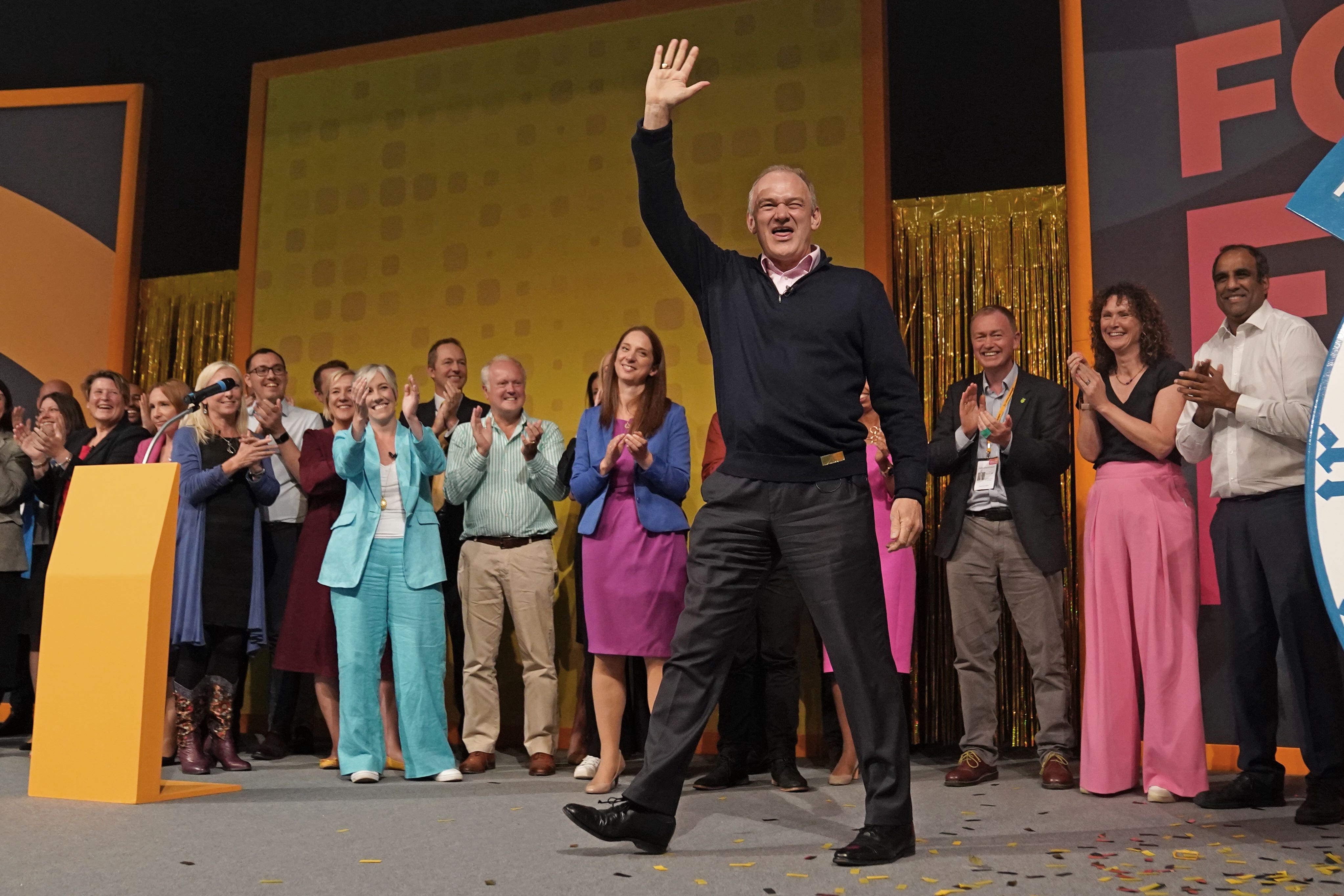Sir Ed Davey says Lib Dems will drop key pledge to put penny on income tax
The Liberal Democrats have become the first major party to adopt an early version of its manifesto for a general election expected next year.

Your support helps us to tell the story
From reproductive rights to climate change to Big Tech, The Independent is on the ground when the story is developing. Whether it's investigating the financials of Elon Musk's pro-Trump PAC or producing our latest documentary, 'The A Word', which shines a light on the American women fighting for reproductive rights, we know how important it is to parse out the facts from the messaging.
At such a critical moment in US history, we need reporters on the ground. Your donation allows us to keep sending journalists to speak to both sides of the story.
The Independent is trusted by Americans across the entire political spectrum. And unlike many other quality news outlets, we choose not to lock Americans out of our reporting and analysis with paywalls. We believe quality journalism should be available to everyone, paid for by those who can afford it.
Your support makes all the difference.The leader of the Liberal Democrats Sir Ed Davey said he will drop a key pledge to put a penny on income tax to improve public services as the party announces a host of policies aimed at winning over Tory heartlands.
He said the commitment – which dates back to 1992 – was unsustainable when people are struggling with the cost-of-living crisis.
Speaking to The Times, he said: “We’ve had two years of frozen income tax allowances and four more years to come. Those six years of stealth income tax rises equate to more than a 3p rise in the basic rate of tax,” Sir Ed said.
“You can’t ask working families to pay more in tax. You just can’t.
“In the blue wall seats, which we’ve never really been competitive before, the evidence is we’re now becoming super-competitive.”
The Liberal Democrats have become the first major political party to adopt an early version of their manifesto for a general election expected next year as they enter their third day of annual conference.
Keeping the triple lock for pensions, introducing a £5 billion social care package and banning sewage dumping are among pledges the party says are central to the newly approved document.
Its focus is on local health services and the environment, which the party believes is crucial to woo traditionally Conservative voters in places like southern England.
But questions persist over national issues like its stance on Brexit, with party leader Sir Ed Davey heckled on Sunday after insisting to delegates during a Q&A that he was “campaigning hard on Europe”.
“No, you’re not,” one audience member replied.
Sir Ed has said people on the doorstep just “aren’t talking about Europe”, but senior figures – including former leader Sir Vince Cable – have argued the party should not lose sight of the issue.
“I really don’t think it’s sensible to say because the public aren’t talking about Brexit, we mustn’t,” he reportedly told a fringe event elsewhere.
An ultimate goal to return to membership status within the bloc is currently official policy, but the leader has been reluctant to speak publicly about this and says it is currently off the table.
Sir Ed has advocated “root-and-branch” reform of the existing Trade and Co-operation Agreement (TCA), but framed this as a long-term challenge, arguing a “realistic” approach is necessary.
Newly relaxed housing targets may also prove controversial with activists when they are debated on Monday.
The party has committed to building 150,000 social homes a year – shifting away from a pledge to build 380,000 homes annually in its 2019 manifesto.
But one Lib Dem council leader, speaking at a fringe event alongside housing spokeswoman Helen Morgan, said abandoning national housing goals would be an “abdication of responsibility” and warned against “fluffy local targets”.
The leadership is expected to face opposition from some members of the party on Monday, with a motion put forward by the Young Liberals seeking to insist on the 380,000 target.
Sunday’s debates focused on proposals to improve NHS services, such as the introduction of mental health “MOT checks”, similar to current regular check-ups for physical health.
Retaining the triple lock, which increases the state pension in line with whichever is highest out of wages, inflation or 2.5%, has also become official policy.
Sir Ed said the mechanism would be kept under any circumstances, which neither the Conservatives nor Labour have promised to do.
Protecting Britain’s rivers with a special “blue flag” status to prevent sewage dumping and the right to see a GP within seven days is also part of the pre-manifesto paper.
The party has said a fully costed version of its manifesto will be mapped out at a later stage, but suggests many of its current policies would generate productivity gains that would help funding.
Reforms to the way the NHS is run, such as improving IT services to make record-keeping more efficient, would also be part of its plan.
Sir Ed has said its proposed social care package, which would see people “be looked after where they want to be at home”, could also save money by freeing up hospital beds and relieving pressure on care homes.
The party returns to conference buoyed by a series of by-election successes and gains during the May local elections, and say they are fully focused on winning as many seats as possible.
Sir Ed has been reluctant to discuss the prospect of a powersharing pact with the Opposition in the event of a hung parliament.
He told the Times: “I said no pacts and no deals. That is our policy,” he told Times Radio.